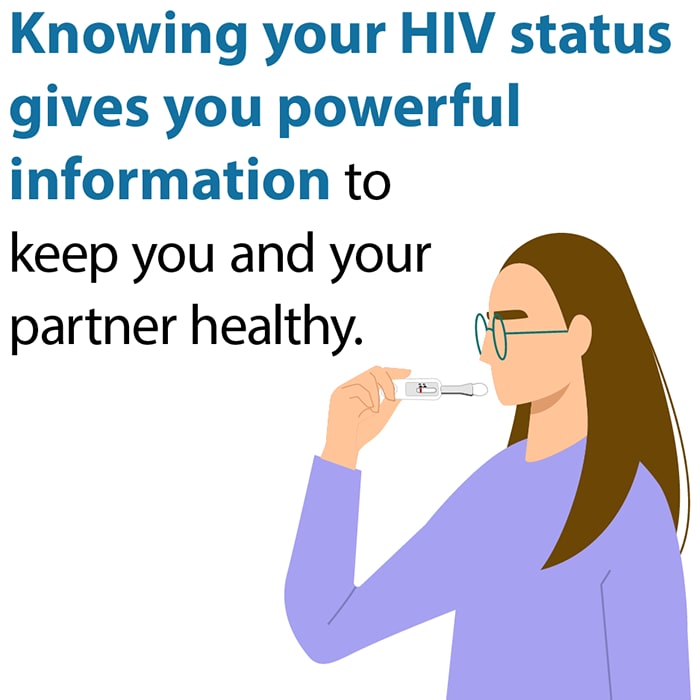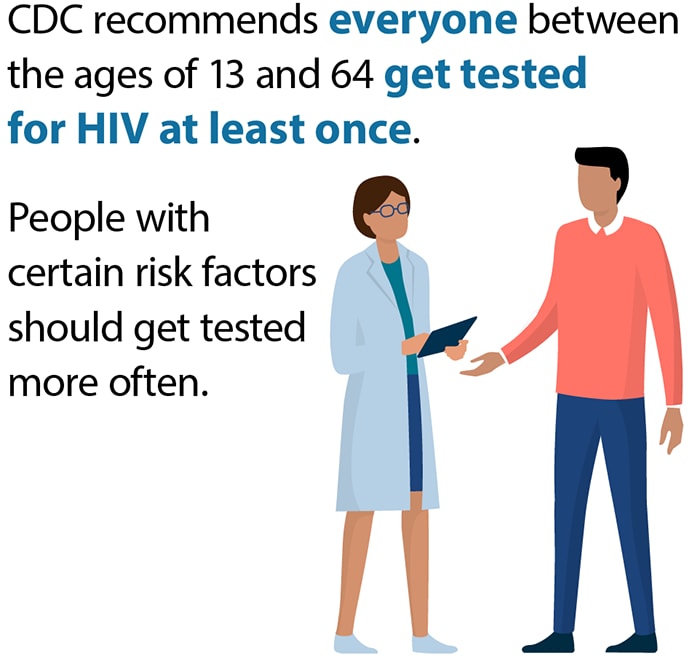How does taking an HIV test help me?
Knowing your HIV status gives you powerful information to keep you and your partner healthy.
- If your test result is positive, you can take medicine to treat the virus. HIV treatment reduces the amount of HIV in your blood (viral load). Taking HIV treatment as prescribed can make the viral load so low that a test can’t detect it (undetectable viral load). Getting and keeping an undetectable viral load (or staying virally suppressed) is the best way to stay healthy and protect others.
- If your test result is negative, you can take actions to prevent HIV.

CDC recommends everyone between the ages of 13 and 64 get tested for HIV at least once.
People with certain risk factors should get tested more often. You should get tested at least once a year if:
- You’re a man who has had sex with another man.
- You’ve had anal or vaginal sex with someone who has HIV.
- You’ve had more than one sex partner since your last HIV test.
- You’ve shared needles, syringes, or other drug injection equipment (for example, cookers).
- You’ve exchanged sex for drugs or money.
- You’ve been diagnosed with or treated for another sexually transmitted disease.
- You’ve been diagnosed with or treated for hepatitis or tuberculosis (TB).
- You’ve had sex with someone who has done anything listed above or with someone whose sexual history you don’t know.

Before having sex for the first time with a new partner, talk about your sexual and drug-use history, disclose your HIV status, and consider getting tested for HIV together.If I’m a sexually active gay or bisexual man, how often should I get tested?
If you’re a sexually active gay or bisexual man, you may benefit from more frequent testing (every 3 to 6 months). Talk to your health care provider about your risk factors and what testing options are available to you.Should I get tested if I’m pregnant?

All pregnant people should get tested for HIV so they can take steps to stay healthy and protect their baby.
- Testing pregnant people for HIV and treating those who have HIV has decreased the number of babies born with HIV.
- HIV treatment is most effective when started as early as possible during a pregnancy. However, there are still great health benefits to beginning treatment even during labor or shortly after the baby is born.
- If a pregnant person gets HIV treatment early in their pregnancy, the risk of transmitting HIV to their baby is extremely low (1% or less).
- Pregnant people who test negative for HIV can talk to their health care provider about taking PrEP (pre-exposure prophylaxis) to prevent HIV.
Should I get tested for HIV if I don’t have any risk factors?
CDC recommends that everyone between the ages of 13 and 64 get tested for HIV at least once as part of routine health care, and more often if you do things that might increase your chance of getting HIV.
Even if both you and your partner are having sex only with each other, you should both find out your HIV status.Who will pay for my HIV test?
HIV tests are covered by health insurance without a co-pay, as required by the Affordable Care Act. If you do not have medical insurance, some places offer free or low-cost tests.
Source: https://www.cdc.gov/hiv/testing/?CDC_AAref_Val=https://www.cdc.gov/hiv/basics/hiv-testing/getting-tested.html



